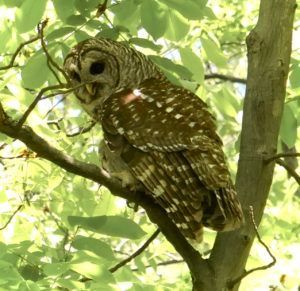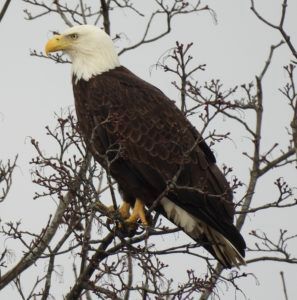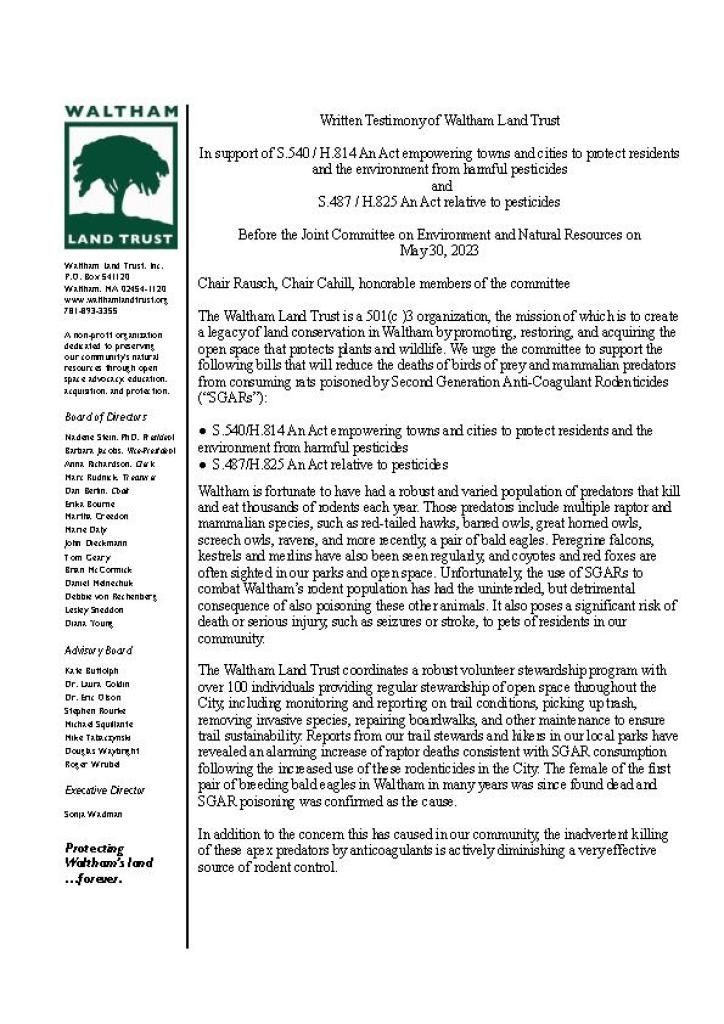Save Waltham Wildlife
Save Waltham Wildlife (SWW), a Waltham Land Trust initiative, began in February 2023, when several WLT volunteer trail stewards attended a presentation in Lexington by Laura Kiesel, the founder and driving force of Save Arlington Wildlife. The primary goal of both groups at this time is to limit and eventually ban altogether the use of Second-Generation Anti-Coagulant Rodenticides (SGARs), which have been killing local raptors (including three eagles).
Because SGARs act slowly, rats who have eaten SGARs have time to wander out into the open and, as they are dying, to become the prey of hawks, owls, eagles, foxes, and, sometimes, family pets. In digesting the rat, the predator also ingests the poisons, leading to internal bleeding and all too often to death
Since banding together, SWW's main activities have been raising awareness, lobbying local officials, and gathering information. In terms of raising awareness, one of SWW's first major initiatives was to bring Laura Kiesel to Waltham, where she gave a presentation on SGARs and alternative methods of rodent control at the Waltham Public Library on May 6, 2023. See Laura’s slideshow below.
Later in May 2023, the Waltham Land Trust submitted a letter of support for two bills at the statehouse, one of which gives control to local communities regarding use of pesticides. You can read it below.
On March 9, 2024, SWW joined forces with Mass Audubon to hold a hybrid meeting reiterating the dangers of rodent poison and ways local residents can get involved protecting Waltham wildlife. Watch the video of the meeting to learn more.
SWW held a follow-up Zoom meeting on March 28. Here is a PDF of the slide presentation.
SWW and WLT will continue to lobby for city-wide banning of SGARs and for a more holistic approach to rodent control, involving better trash management (including the provision of large, rodent-safe trash bins to all Waltham residents) and greater use of both Contra-pest and snap traps.
Latest SWW News
SWW End of summer update September 5th, 2025
We’re happy to report that Waltham’s two universities, Bentley and Brandeis, which between them cover a good deal of green space and border on much more, have both stopped using SGAR poisons on their campuses. Bentley University clarified to us last spring, after several contacts, that they do not currently use SGARs in their bait boxes. More recently, Brandeis University agreed to stop using SGARs on their campus, after lobbying from SWW and from student groups. This is an especially welcome development given that several dead hawks, as well as a dying coyote pup, all found on the Brandeis campus, had tested positive for SGAR poisoning. (See the relevant article in the Waltham Times.)
SWW has since reached out to Brandeis students (some of whom have joined our email list!) regarding the importance of proper trash disposal and management for keeping rats at bay by depriving them of ready food sources. Part of this effort has been to have Brandeis students to take the “CAMPUS CHAMPION PLEDGE” (see the picture).
SWW End of summer update September 5th, 2025
We’re happy to note that the City’s new dumpster ordinance, which passed last spring with modifications suggested by SWW members and others, has come into effect as of this June. If you notice a problem dumpster in your neighborhood (overflowing, uncovered, rusted out, etc.), you might consider reporting it to the Health Department (781-314-3305). We have also been pleased to see some new big belly trash/recycling receptacles appearing around Waltham, for example at the newly renovated Logan Park, in addition to those installed earlier on the Waltham Common and on Main and Moody Streets. If there’s a park or playground near you that could use big belly receptacles, you might try reaching out to your Ward Councillor: https://www.city.waltham.ma.us/mayors-office/faq/how-do-i-contact-my-city-councillor.
BY CYD ABNET ● August 21, 2025 ● The Waltham Times
A young coyote found at Brandeis University on July 25 has tested positive for a significant amount of second-generation anticoagulant rat poisons, two of which Brandeis University has reported using in the past. The coyote was found alive and died while in the care of a wildlife rehabilitator. Before its death, the rehabilitator reported that the coyote had a delayed blood clotting time, which is typical of SGAR-poisoned wildlife.
Sonja Wadman, director of Waltham Land Trust, says that Brandeis has pledged to stop SGAR use on their property. Wadman and the president of Brandeis Students for Environmental Action attended a meeting on May 1 with two Brandeis officials to discuss their SGAR use.
By Linda Graetz, Guest Writer ● July 25, 2025 ● The Waltham Times
The death of a majestic bald eagle during the winter of 2023 sent shockwaves through the environmental community and sparked a local movement that continues today. The eagle, known as MK, was the third member of a family that once lived in Waltham’s Mount Feake Cemetery to die from anticoagulant rodenticide poisoning. This was yet again a tragic reminder of how efforts to control rodent populations can have devastating unintended consequences.
Inspired by environmental advocate and journalist Laura Kiesel’s presentation on the dangers of second-generation anticoagulant rodenticides to wildlife, four concerned Waltham Land Trust members formed Save Waltham Wildlife that February. The group has an ambitious goal: to reduce and eventually eliminate the use of these deadly poisons throughout the city. SWW’s mission has taken on new urgency as Waltham grapples with what many residents simply call “the rat problem.”
By Newsroom ● July 25, 2025 ● The Waltham Times
The Waltham Land Trust met last Wednesday at the Charles River Museum of Industry & Innovation with teens from the Boys & Girls Clubs of Waltham, Watertown and Newton. The participants were invited to brainstorm ways to engage younger people in the WLT’s work to end the use of rat poison that can harm and kill wildlife and outdoor pets. The meeting was organized by the WPS Institute, a local nonprofit that fosters educational innovation and opportunity in the classroom and beyond.
Save Waltham Wildlife, an initiative of the Waltham Land Trust, was thrilled to be part of this exciting day of advocacy at the MA State House, urging legislators to pass H.965/S.644, a bill to restrict the use of rodenticides statewide.
Over 200 fellow nature lovers from the Berkshires to Cape Cod attended, with 50+ groups tabling to help spread the word.
We were happy to share our concerns with staff from Rep. Lawn and Rep. Stanley, and were grateful to personally meet with Senator Barrett. All three are co-sponsors of the bill.
See all the pictures on our Flickr!
What You Can Do
REPORT any lethargic or injured hawk, owl, or other wildlife that you see:
- Contact a wildlife rehabilitator: https://www.mass.gov/info-details/find-a-wildlife-rehabilitator or contact Cape Ann Wildlife at 1-978-325-2501, http://www.caw2.org/
- Please stay with the bird until someone comes to pick it up. If you feel you can’t do this, photograph the bird, make note of its location and call someone who can stay with it until help arrives.
ALSO REPORT:
- Any dead rat/rodent on city property (conservation land, sidewalk, street, parking lot, around a public building). Immediately contact Public Works at 781-314-3855 for its removal. Photograph and make note of location.
Note and record any animal (wild bird, mammal, or pet) consuming or feeding on a dead rat or mouse.
To learn more and become involved with SWW, please email savewalthamwildlife@gmail.com.
The Rat Poison Problem: How Rodenticides Harm People, Pets, & the Planet
Climate change, a construction boom, and growth in human population density have led to a dramatic rise in rats and mice in and around metro areas like Boston. Rat poison usually is the main method for dealing with the problem. But these poisons are killing local wildlife and pets and endanger our young children, while not actually proving at all effective in reducing rodents.
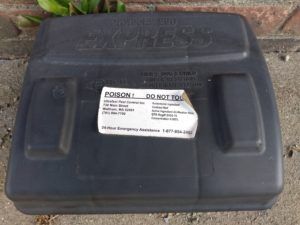
A rat bait box
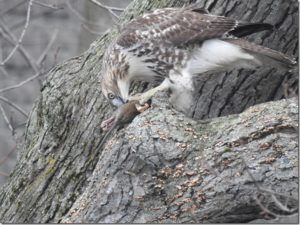
Hawk eating a rat
On May 6th, 2023, local naturalist and conservation advocate Laura Kiesel gave a presentation that reviewed the history of rodenticides, their impact on our health and environment, and solutions for a way forward that preserves our planet.
Watch the May 6th 2023 Presentation by Laura Kiesel
Slideshow by Laura Kiesel
Letter of support for two bills
Click on the letter of support to download and read
